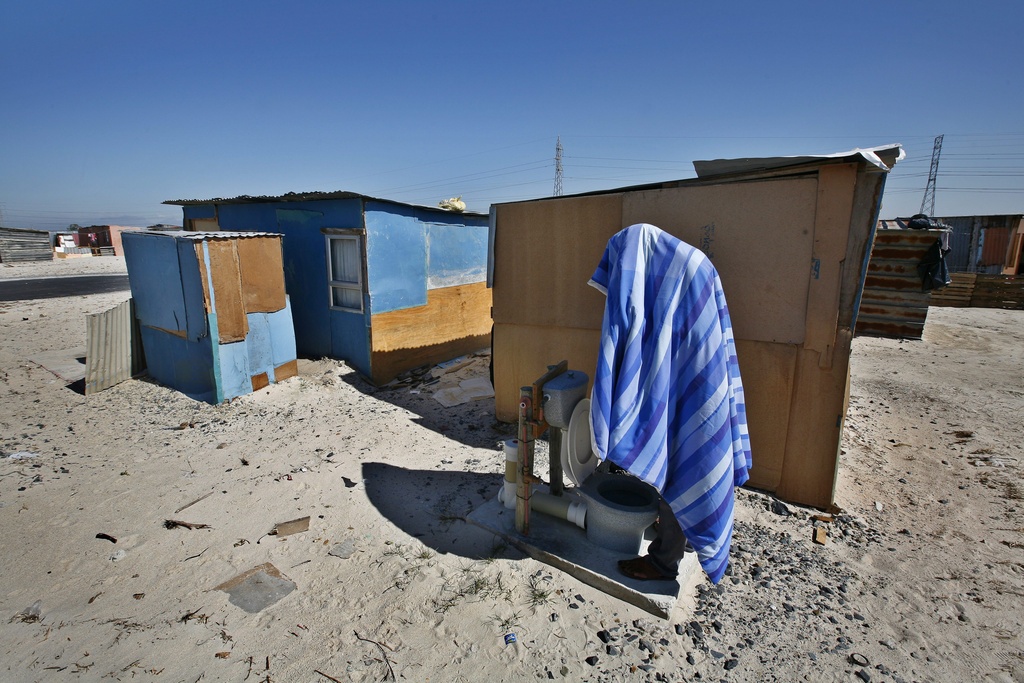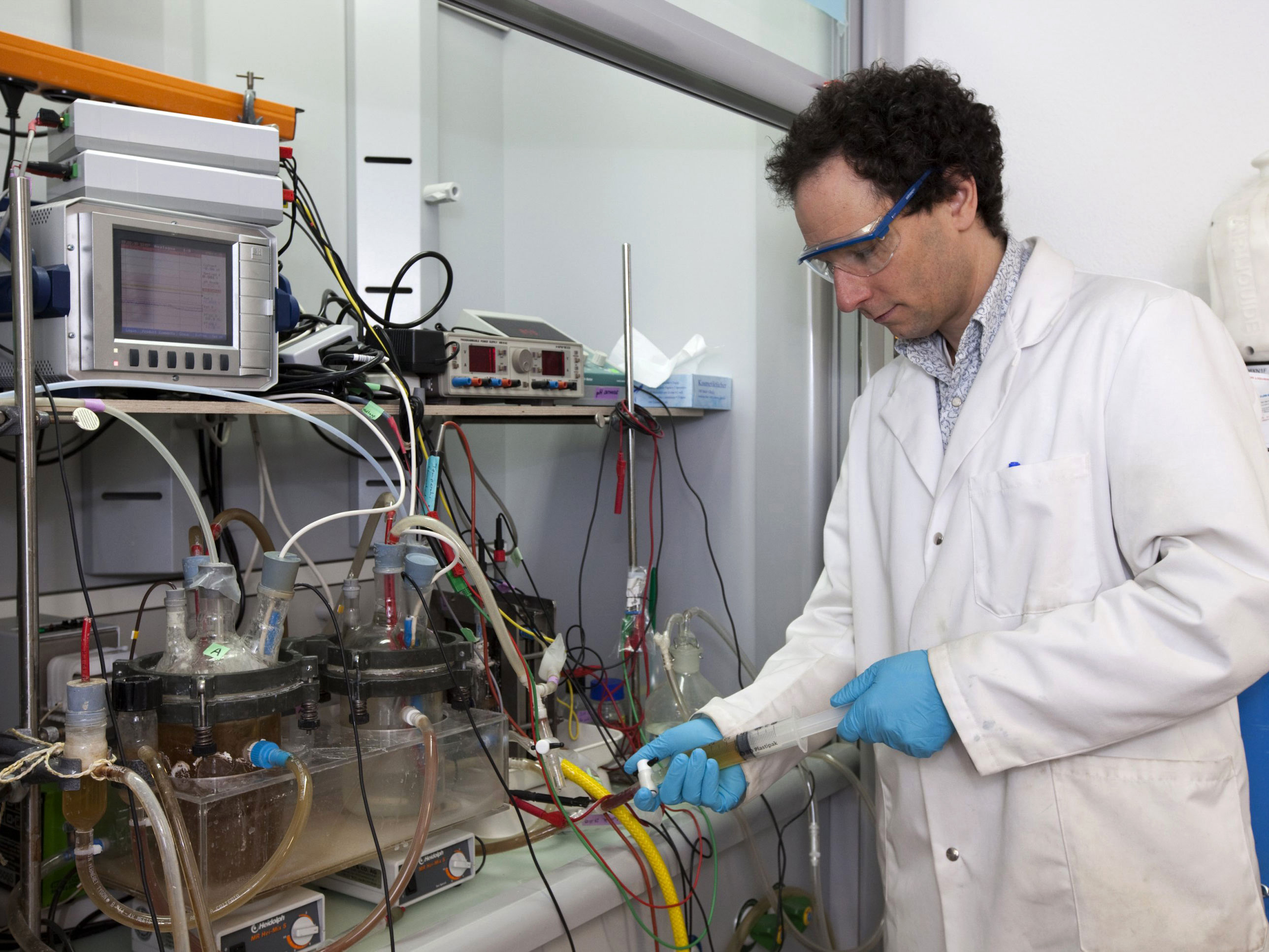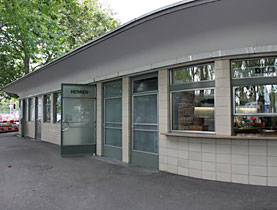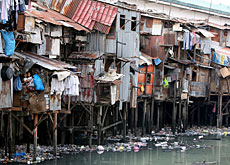Protecting dignity and saving lives

A child dies of diarrhoea every 20 seconds as a direct result of inadequate sanitation, whether through contact with excreta, or because of polluted drinking water.
Sanitation is often a taboo topic, a “dirty” topic, as Chris Zurbruegg, head of Water and Sanitation in Developing Countries at the Swiss Federal Institute of Aquatic Science and Technology (Eawag), tells swissinfo.ch.
November 19 is World Toilet Day, whose aim is to try to raise public awareness of the importance of adequate sanitation facilities – something that 2.6 billion people currently lack, according to United Nations estimates.
swissinfo.ch: What’s it like if you live in a developing country and suddenly have to go to the toilet in the middle of the night?
Chris Zurbruegg: The chances are very high that you don’t have a toilet. Where sanitation is inadequate, there’s excreta all over. You’re in continuous contact with it when you’re walking through the neighbourhood. When you go to an open defecation field, everyone has used it before.
In an urban centre they tend to focus on places where there is space and a certain amount of privacy. In more rural areas, it can be distributed all around the fringe of the village.
swissinfo.ch: Do people try to avoid areas that everyone has to walk through?
C.Z.: Not necessarily. People optimise not in terms of where is best, but where is more convenient. If you are going to defecate in the night, you don’t want to walk too far, but you want a certain level of privacy, so you have these optimisation areas, the open defecation areas.
swissinfo.ch: What impact does all this have?
C.Z.: Of course the main problem is hygiene. The main illness from being in contact with faeces is diarrhoea, which is one of the main causes of child deaths, especially among under-fives.
There’s also the issue of dignity, of privacy. And there is risk, especially for women if they have to go out at night – they can be subject to violence. Studies have shown that women don’t go to the toilet at night; and they can’t go during the day because they are exposed. This means they can only go at dusk and dawn. Imagine trying to restrict your toilet needs to only two periods in the day. This leads to bladder infections, so there are not only psychological effects, but also health aspects.
swissinfo.ch: You mentioned privacy, but in China for example, if you go to a public toilet often there are no doors, and people chat happily to each other as they squat over a hole.
C.Z.: It’s important to realise that there are cultural differences. Our research always highlights that sanitation is not a only a technical issue. It’s a lot about cultural values, and the way people use sanitation.
One aspect which is very important in Asia is using human waste as a source of fertiliser. In a way that’s a really good practice, because you’re making the best value from your resources; on the other hand you’ve got to make sure that the risks are minimised, because excreta can transmit disease.
One thing we are working on in our research is how you can make best use of the resources in excreta. You need a treatment facility that eliminates bacteria but keeps the nutrients.
swissinfo.ch: What solutions are you coming up with?
C.Z.: Our sanitation planning research is about coming together with the community to find the most appropriate and acceptable sanitation solution for them. It’s more about understanding the process of planning, than what solution we come up with.
There’s a variety of solutions, but every solution has advantages and disadvantages, and we have to find out which solution is best for the particular local context.
One thing we are working on is separating urine from faeces, because urine has all the nutrients, and no pathogens. If we can keep it separate, we can make the best use of it as a fertiliser.
swissinfo.ch: Presumably people have to be taught how this all works?
C.Z.: Exactly. That’s why I said it’s not only a technical issue. It needs a certain change of behaviour – and in general it’s difficult to get people to change their behaviour. That’s true in Switzerland too!
One part of our research – and we’re working with social psychologists on this – is trying to see what are the best mechanisms we can use to make people change their behaviour in a long term way.
Understanding what works makes projects much more effective.
swissinfo.ch: So you are working closely with people on the ground.
C.Z.: Very much so. This isn’t something you can do in the office or in the library.
swissinfo.ch: Do you find there’s a big difference between countries?
C.Z.: No, actually, the way people behave from a psychological point of view is quite similar. There are just different mechanisms. Maybe in some cultures the peer pressure from your neighbourhood is a strong driver to change, in other places it’s the teacher in the village who is a figure of respect. If the teacher does it, people believe it and also do it.
What we are also looking at is solutions that can be managed by the community themselves. In a developing country context these things often work much better if you’re in charge and are responsible and know what happens – or doesn’t happen – to your waste, rather than relying on some municipality or government institution where the risk is very high that nothing will happen.
swissinfo.ch: Are people actually crying out for better sanitation?
C.Z.: They might not see the direct health implications – the connection between diarrhoea and sanitation is not always evident. So they might put privacy, dignity and convenience more to the fore. But it’s very clear that they want things to improve.
The commonest type of inadequate sanitation are “open defecation fields” – empty spaces in which people relieve themselves.
A pit simply without appropriate covering is not also regarded as adequate, as people could fall in and cleanliness is not ensured.
In some countries, people defecate into a plastic bag, which they then tie up and usually throw onto a dump or onto an empty plot. These are often referred to as “flying toilets”.
Adequate sanitation is defined as including a safe disposal system.
A pit latrine is regarded as adequate if it consists of a pit covered by a stable slab or floor with an appropriate squatting hole or pedestal (seat) hole. This does not require flushing water.
A “double vault” pit latrine is also a suitable solution where there is a lack of water. It consists of two pits used alternately. When one is full, the other is used. The full one is closed off and left to decompose naturally, in a process which also kills the pathogens. When the second is full the first can be emptied and is safe to use in agriculture.
To separate nutrient-rich urine from faeces, a special kind of toilet is needed. People however have to learn how to use this toilet properly.
Western-style flush toilets, where waste disappears into a sewer transported by water and is treated at a treatment plant, use up to 16 litres of water per flush, although this has been considerably reduced in recent models. Transport of waste through a sewer is not sufficient if it is then discharged untreated into a river.
Chris Zurbruegg heads the Water and Sanitation in Developing Countries (Sandec) at the Swiss Federal Institute of Aquatic Science and Technology (Eawag).
His department, of 15-20 people, includes specialists from a wide range of disciplines, including environmental engineering, biology, geography and urban planning.
Eawag is one of the partner institutions in the National Centre of Competence in Research North-South, which is hosted by Bern University. This is is a research programme in the fields of global change and sustainable development.

In compliance with the JTI standards
More: SWI swissinfo.ch certified by the Journalism Trust Initiative




You can find an overview of ongoing debates with our journalists here. Please join us!
If you want to start a conversation about a topic raised in this article or want to report factual errors, email us at english@swissinfo.ch.